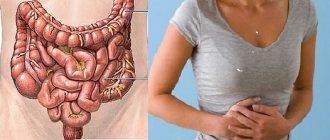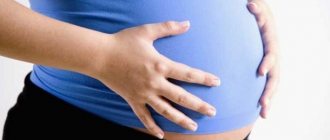24-72 hours after insemination, in the presence of other favorable factors, the sperm meets the egg and conception occurs. Many expectant mothers are bothered by different sensations in the abdomen in the early stages of pregnancy; most often, temporary discomfort is caused by physiological reasons, but it can also indicate dangerous pathologies.
After conception in the early stages of pregnancy, uncomfortable sensations arise in the abdomen
Lower abdominal pain after conception
The occurrence of pain after conception in the lower abdomen is quite natural, since pregnancy is a difficult process for the female body. Discomfort is considered one of the initial signs of this situation.
This occurs due to the fact that after conception the body itself undergoes restructuring and prepares to bear a fetus or, conversely, to reject a foreign body, creating all the prerequisites for a miscarriage.
It is necessary to establish the origin of pain, why it occurs and whether it is a normal reaction of the body or is associated with some pathology.
Such discomfort may appear 4-6 days after conception, since during this period the embryo begins its movement towards the uterus. There it stops and continues its development.
In addition, there is pain in the lower abdomen until it can attach to its wall. Unpleasant sensations can alert women, in particular those who have been planning a pregnancy for a long time.
Therefore, in order to avoid negative consequences, it is necessary to carry out diagnostics under the supervision of a qualified specialist.
Causes of pain after conception
When, after conception, the lower abdomen hurts, if a woman notices delayed menstruation, nausea, hypersensitivity to certain smells and foods, increased appetite, then this may indicate that she is pregnant.
However, in some situations, the reasons for pain in the lower abdomen may be a hormonal imbalance within the body, as well as dangerous diseases.
Pain in the lower abdomen can be caused by:
- sudden movements;
- lifting something heavy;
- strong psycho-emotional shocks;
- bloating, during which the uterus is compressed;
- falls or blows.
Often, the lower abdominal region may feel tight and painful in women who have weak abdominal muscles or who had a painful menstrual cycle before pregnancy.
Pathological causes can also provoke such discomfort:
- Sudden drop in progesterone levels. When this happens, the woman’s body tries to reject the fetus as a foreign body. The tone of the uterus itself increases, and it tries to push out the embryo.
- Ectopic pregnancy. Acute pain in the lower abdomen may appear 20-50 days after conception, taking into account the location of the fetus.
- Spontaneous abortion. At this time, the tone of the uterus increases significantly, intense pain appears in the lower abdomen, pain in the lumbar region, and discharge with blood is observed.
- Placental abruption. In addition to severe pain, moderate or severe vaginal bleeding is noted.
- Viral diseases of the genitourinary system. Inflammation that occurs inside the bladder causes burning and pain during urination.
- Isthmic-cervical insufficiency. It is characterized by thinning and softening of the cervix.
- Pathological processes in the digestive organs. The lower abdomen may hurt as a result of pathology that can occur in the gastrointestinal tract.
The reasons for unpleasant discomfort are different, but the result without therapy will always be the same - spontaneous miscarriage at an early stage.
First signs of pregnancy
In the first days after fertilization of the egg, signs of pregnancy appear in very few women. However, every expectant mother should know about the peculiarities of changes in well-being in the early stages of gestation. The sooner a woman finds out about her pregnancy, the faster she can make adjustments to her own lifestyle. First of all, she needs to give up bad habits and change her diet.
Signs of pregnancy before missed period
Even before the start of a delay in menstruation, a woman may notice some changes occurring in her body. These include:
- Heaviness and pain in the chest. This symptom belongs to the group of subjective signs of pregnancy. Pain and swelling of the mammary glands in many women is considered normal for the second half of the menstrual cycle.
- Nagging pain in the lower abdomen. This sign is most often perceived by women as a harbinger of approaching menstruation. During early pregnancy, nagging pain in the lower abdomen is often a symptom of a threatened miscarriage, since in the first weeks the uterus does not yet have time to enlarge and stretch. If pain appears even before ovulation and is localized on the side of one of the ovaries, discomfort may be evidence of its onset.
- Changes in basal temperature. Such changes will be noticeable if a woman regularly measures her rectal temperature and makes a chart. Hormonal changes in the early stages of pregnancy lead to the fact that the expectant mother's basal temperature rises to 37 degrees.
- Toxicosis. Nausea and frequent vomiting may occur in a woman from the moment the fertilized egg is implanted into the uterine wall.
In addition, in the first weeks after conception, fatigue and drowsiness increase, frequent mood swings, irritability and even aggressiveness towards others are observed. The attitude towards food and smells may change.
Signs of pregnancy after the start of delay
Actually, the delay of menstruation itself, even in the absence of other subjective signs, which intensify every day with the onset of pregnancy, is the first and main symptom of successful conception. You can refer to a delay only if the woman has a regular, stable cycle.
Read more Prostatitis in men: causes, treatment
You can confirm pregnancy in the following ways:
- Test strip. The first thing many women do when a delay begins is to use tests to determine pregnancy. The cherished two stripes appear already from the first day of the delay, that is, 1-2 weeks after fertilization of the egg.
- Ultrasonography. Almost immediately after the delay, an ultrasound scan can examine the fertilized egg. Its absence in the uterine cavity in the presence of other obvious signs of pregnancy may indicate that the fertilized egg has settled in one of the fallopian tubes.
- HCG level. The concentration of the hormone increases on the second day after conception. An increase in hCG levels is the main sign that gynecologists focus on when making a “diagnosis”.
With the onset of pregnancy, a lot of changes occur in the body of the expectant mother. In some women they appear earlier, in others later. The presence of several of the above signs is enough to draw conclusions about successful conception.
Symptoms
Symptoms of pain after conception make it possible to find out how the conception itself occurred, how the pregnancy is proceeding, why this discomfort occurred and whether you should consult a doctor.
Unpleasant sensations can be different, for example, stabbing, pulling, weak, aching, strong.
In a healthy body, pain that appears after conception may indicate that the embryo is trying to attach itself to the walls of the uterus.
The main symptoms of harmless pain appear after 2-3 days or even 7 days.
It is necessary to contact a specialist without delay when there is pain in the lower abdominal cavity, along with the following symptoms:
- increase in general temperature;
- decrease in basal temperature;
- vomiting reflex;
- diarrhea;
- intense discharge or vaginal bleeding;
- dizziness, lethargy, loss of consciousness;
- irritability;
- sudden increase or decrease in blood pressure;
- chest pain. The breasts can become extremely sensitive, the skin near the nipples darkens, and in addition, they can increase in size for a short period of time.
Such symptoms may indicate the existence of a serious pathological process and often require inpatient therapy or surgical intervention.
What to do if you miss your period and have a tight stomach?
If your period is delayed by 4 days and is accompanied by nagging pain in the abdominal area, you need to purchase a pregnancy test at the pharmacy. The procedure is recommended for all women who have regular sex life - no contraceptive means can provide a 100% guarantee against pregnancy. If the test gives a negative result, you need to contact a gynecologist as soon as possible - only a gynecologist can determine the exact cause of delayed menstruation. In cases where a cycle failure is accompanied by bloody discharge, severe pain or fever, medical help should be sought immediately - such conditions can threaten the health or even life of a woman. Cardiac arrhythmia treatment tablets read on our website.
Diagnosis of pain after conception
Diagnosis of pain after conception is carried out by a qualified specialist, since only a doctor is able to accurately determine why the pain appeared, whether it is pathological in nature or not.
Unpleasant sensations and various complaints must be taken into account by a gynecologist.
When, after conception, there is pain in the lower abdomen, this is a normal reaction to the onset of pregnancy. If a woman feels muscle pain, it is extremely difficult to detect it.
Symptoms of such pain are revealed after a series of tests carried out over 2-3 days.
Examination of discomfort after conception is complicated by the fact that a woman may have hidden diseases that manifest themselves due to increased hormonal levels.
To determine the provoking factors, a pregnant woman must undergo certain tests. For example, ultrasound, stool, blood and urine tests.
This helps determine the hormonal level in the blood, which can provoke pain.
The main thing that you should not do when your stomach hurts after conception is to independently diagnose and prescribe treatment for discomfort.
Self-treatment can aggravate the situation and cause adverse consequences.
White discharge with delayed menstruation
Along with a delay in menstruation, a woman may experience white discharge. Sometimes heavy white discharge appears in pregnant women, which indicates the formation of a mucous protective plug against infection.
White discharge may be due to stress
The notorious stress can also be the culprit of white discharge. Doctors advise in this case to take mild sedatives and rest so that the cycle failure does not become permanent.
But, unfortunately, discharge most often signals infections of the genitourinary organs:
- candidiasis (thrush)
- oophoritis, salpingitis
- inflammation of the appendages (adnexitis)
White discharge against the background of delay appears due to previous respiratory infections, as well as as a result of hormonal imbalance of the thyroid gland of the adrenal glands.
Long absence of menstruation is an alarming sign. It is advisable to contact a gynecologist to take a smear for microflora, take blood and urine tests, and, if necessary, undergo colposcopy and ultrasound diagnostics.
Sometimes white discharge is not associated with a delay in menstruation; its occurrence is caused by an allergy to underwear, diabetes, or taking hormonal contraceptives.
Cycle fluctuations and the occurrence of pain during delay are influenced by a huge number of factors, except pregnancy. This includes the first sexual experience, the approach of menopause, excessive intensity of physical activity and heavy lifting.
Preparing for exams, submitting quarterly reports, weddings and funerals are just a minimal list of events that can upset the delicate balance of a woman’s hormonal system. The main task of the fair sex is not to miss the onset of the inflammatory process or the failure of a long-awaited pregnancy. Therefore, regular long delays are recommended to be treated in the gynecology department.
Feb 17, 2016Violetta Lekar
Source: VseLekari.com
Treatment
Therapy for pain after conception helps eliminate spasms and muscle discomfort that manifests itself in the ovaries and lower abdomen.
Treatment begins only after a thorough examination and passing the necessary tests.
When conception is successful, but discomfort remains and the specialist has determined that the origin of the discomfort is not pathological, then drug therapy is possible only in the postpartum period.
However, if complications arise or treatment of painful sensations after conception must be carried out without delay, then this can become a threat to the life of the fetus. Therapy can be started when:
- Twist the legs of the cyst. Associated with severe muscle pain, therapy involves only surgical intervention.
- Placental abruption. Therapy is carried out only in stationary conditions.
- Progressive ovarian cyst and the risk of its rupture. Treatment is carried out only through surgery.
- Exacerbation of cholelithiasis. Drug therapy is being carried out.
When, after diagnosis, it is determined that the body is completely healthy and pain after conception is a normal reaction, then in order to improve well-being, a woman can:
- Take short baths.
- Apply cooling compresses.
- Go swimming, as water is an excellent relaxant.
- Carry out a session of gentle prenatal massage.
The most effective method of treating pain after conception is considered to be performing Kegel exercises. They are aimed at strengthening the groin muscles, vaginal muscles and sphincter muscles.
Prevention
Preventative measures are an excellent solution to prevent discomfort and ill health. The most effective method of prevention is exercise.
Constant training prevents muscle strains and intense pain in the ovaries; in addition, training prepares the body for proper fertilization.
Additional preventive measures:
- regulation of body weight before conception;
- physical activity that helps maintain muscle tone in the abdomen, back and lower extremities;
- timely treatment of viral diseases;
- reviewing the menu, saturating the diet with fiber, complex carbohydrates, proteins, fats, vitamins and minerals;
- fractional meals, including several meals per day;
- proper work and rest schedule;
- minimizing stress;
- refusal of products that provoke fermentation in the intestines;
- cessation of drinking alcoholic beverages and smoking;
- walks in the open air;
- drinking the required amount of fluid (at least 1.5 liters per day);
- use of medications only as prescribed by a specialist.
Following the doctor’s recommendations cannot fully prevent the occurrence of painful sensations, however, it will reduce the number of cases when there is a tugging in the lower abdomen or other phenomena that cause discomfort are noted.
When, after conception, there is pain in the lower abdomen, it is necessary to consult a doctor as soon as possible. It’s easier to prevent the problem from the beginning.
It is optimal to prepare for conception together with a specialist and begin preventive therapy to avoid possible complications. It is necessary to follow all doctor's instructions from the beginning of pregnancy.









